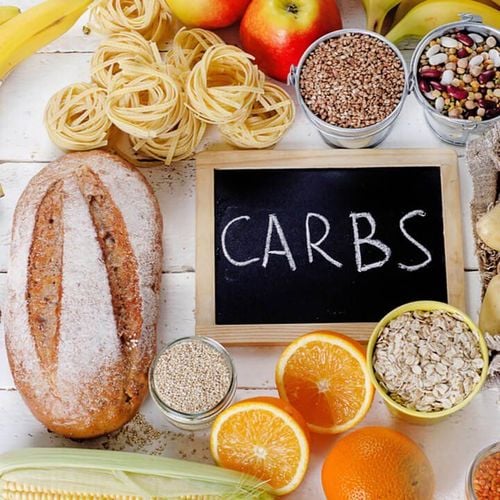This is an automatically translated article.
The controversy surrounding Carbohydrates (carbs) is always a hot topic. Although many studies have been conducted, the research results are conflicting, and there are few studies that agree on how to eat and limit the amount of daily carb needs.1. Low-carb diet
The latest study of nearly 25,000 Americans who presented results at the European Society of Cardiology Congress found that those on a low-carb diet face a 32 higher risk of all-cause mortality. % within the next 6 years. For individual causes, such as cardiovascular disease, stroke, and cancer, the rates were 51%, 50%, and 35%, respectively. The people who carried out the study also evaluated other studies to confirm their results.However experts have pointed out some problems in this study. The study did not clearly define what low-carb is, nor why the study participants practiced a low-carb diet.
Another new Harvard carbohydrate study found that people who ate carbohydrates in the "middle" level, i.e., 50-55% of total calories, had the longest life expectancy. The researchers evaluated the nutrition reports of more than 15,000 adults aged 45-64 years in the United States between 1987 and 1989. Over the next 25 years, those ate carbs in moderation. Moderate (50-55% of total calories) had a lower mortality rate than those on a low-carb diet (<40% of total calories in this study) and those on a high- carbs (in this study > 70% of total calories).
After referencing the results of seven other studies (with more than 432,000 participants), they found that the results were similar, those who ate moderate carbs lived longer than those who did not. eat low-carb or high-carb.
In addition, they also found that a low-carb diet containing animal protein and fat (e.g. beef, pork, chicken) was associated with increased mortality compared with with a low-carb diet containing protein and plant-based fats (such as from green vegetables, nuts, peanut butter, whole grains).
Previous studies have shown conflicting results, some showing that low-carb diets promote weight loss and protect heart health, others showing low-carb diets increase disease rates cardiovascular disease, cancer and increased risk of premature death.

Những tranh cãi xung quanh Carbohydrate (carb) vẫn luôn là chủ đề nóng
2. Definition of carbs
While researchers are trying to figure out the exact number of calories from carbohydrates daily that the human body needs, experts say we need to understand more about carbohydrates, and start with the simplest. : What exactly are carbs?Some carbs come from natural sources, such as in fruits, vegetables, dairy, nuts, grains, sprouts and legumes. Some other carbs are added to processed foods in the form of added sugars or starches.
Sugar - the simplest form of carbohydrate, present in vegetables, milk and dairy products. Starches are complex carbs found in whole grains, green vegetables, and legumes. Fiber (also a complex carb) is found in fruits, vegetables, whole grains, and beans.
The human body converts carbohydrates into sugar or glucose during the digestion of food. Glucose is the main energy source of the human body (including the brain).
Carbs are often blamed for weight gain, but carbs aren't all bad. In addition to providing energy, carb-containing foods (such as whole grains, dietary fiber) can reduce the risk of cardiovascular disease. Fiber is also beneficial for the digestive system, lowering the chances of obesity and type 2 diabetes. Eating healthy carbs in fresh vegetables and whole grains helps control weight. Choosing the right source of carbs for the body as well as keeping the consumption moderate is very important.
3. What is the definition of low, medium, and high?
One issue that is confusing and controversial is the definition of what a low-carb diet is. Most people assume that a carb diet that provides 25 to 30 percent of total energy needs is a low-carb diet.So if a day needs to provide 2000 calories, a 25% carb diet will provide 500 calories, equivalent to eating about 125g of carbs.
Average carb level, normally will be 45 - 65% of total energy provided by carbs. A high carb level will be above 70%.
4. Some carb guidelines

Chế độ ăn low-carb hiển nhiên mang lại lợi ích cho trẻ động kinh
Low-carb, high-carb is useful depending on the purpose, but in a normal state, moderate carb consumption is best.
Low-carb diets are clearly beneficial for children with epilepsy. It also helps to maintain the stability of type 2 diabetes. Eating a small amount of carbs will double the body's ability to burn fat while performing heavy exercise, thereby increasing the effectiveness of exercise. . However, the diet for each case and purpose should follow the doctor's instructions. For example, if the goal is to lose body fat, it may be more beneficial to reduce the amount of fat consumed at meals than limiting carb intake.
Not only carbs, but also lipids or proteins, the most important thing is to maintain a balance and choose a quality source. For best absorption, refer to these guidelines:
Choose a low-refined carb source, like whole grains for example. Quinoa, lentils, beans, ... are very good sources of fiber. Plus, eating these foods makes it a habit to eat more plant foods at meals. The majority of your carb intake should come from fruits, vegetables, and whole grains. The rest is from milk and milk products. With fats, it is recommended to use vegetable oils. For protein, use lean meats, skim milk, and plant-based proteins.
Please dial HOTLINE for more information or register for an appointment HERE. Download MyVinmec app to make appointments faster and to manage your bookings easily.
Article referenced source: Webmd.com












